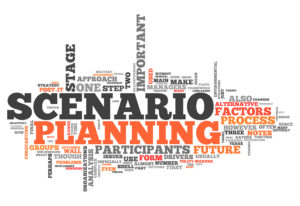Blog
Are You Scenario Planning Around the Coronavirus?
Without wanting to further add to the concern and hysteria around COVID-19 (aka the Coronavirus), fears that there might be a widespread epidemic here in the US are causing widespread business uncertainty (just look at the swings in the stock market the last few days).
This raises questions on how well prepared many business are for unexpected or unusual issues in supply and demand.
Consider the Impact
As an example, have you considered the impact on your business, and what you would do, if:
- A sizable percentage of your workers called in sick and were out for a few weeks?
- Your key vendors experienced a reduction in output due to their workers being ill?
- A measurable percentage of your customers / consumers become unwell for a short period of time?
- A measurable percentage of your customers / consumers become unwell for a long period of time?
- Your inbound and / or outbound logistics takes twice as long as usual?
- People start stockpiling goods and staying indoors?
Why Scenario Planning is Useful
The uncertainty around COVID-19 is a perfect example of why, when faced with uncertainty, scenario planning is useful.
The process of scenario planning (sometimes also called ‘war-gaming’) involves risk-intelligent companies taking time to proactively address risks and consider a variety of possible scenarios to help them ‘pressure test’ and ‘rehearse’ their ability to handle issues as they arise and to spot sources of risk that may otherwise go undetected.
Scenario planning also gives a company the opportunity to challenge key assumptions that underpin baseline business performance and to ‘peer-around’ the corner at alternative versions of the future, with consideration to second and third order effects as well as the obvious ones, because, like an iceberg, much of the risk (ice) often cannot be seen (under the water).
Thinking through various scenarios that are driven either visible trends that are shaping the longer-term future, or by forces and events that cannot be predicted or controlled (such as the Coronavirus) also helps companies prepare for potential situations and build longer-term organizational capability in thinking through other issues in their supply chain (like product recalls) or organization (like a data-breach, a factory fire, or a major vendor going in to bankruptcy) and making the right strategic choices despite the uncertainty.
Scenario Planning Workshops
Here at Core Catalysts, we have run multiple scenario planning workshops for our clients across a wide range of issues:
- One recent example considered the effect on prices, supply, and demand, for Pork products around a variety of scenarios involving Swine Flu.
- Another revolved around potential competitive reactions to merger and acquisition activity in a rapidly consolidating medical specialty market.
We prepare and facilitate scenario planning sessions to help our clients think through and develop of usable strategies and risk mitigation tools for both ‘wildcard’ or ‘black-swan’ events (low-probability, high-impact occurrences that could dramatically change the business environment) and more ‘every-day’ activities (such as product launches, price changes, and other externally facing strategies where the responses of customers, competitors, and other parties can affect results), giving management teams the ability to gauge the effectiveness of existing strategies and tools and to feel better prepared and more confident in their decision making if and when a variety of situations arise.
Do you think you or you team might benefit from a scenario planning workshop? If so, please get in touch to find out more.

